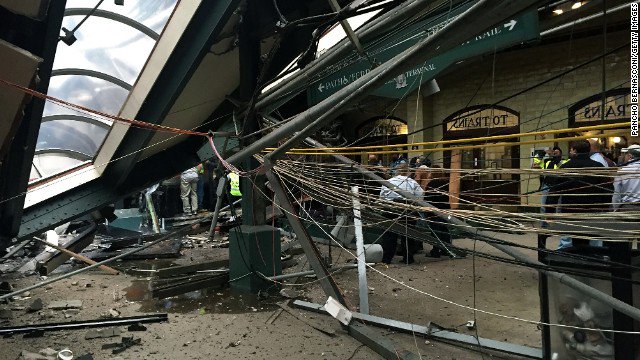
The New Jersey transit agency involved in a rail station crash that killed one person and injured more than 100 last week already was under scrutiny by federal authorities after dozens of safety violations were uncovered this summer.
The Federal Railroad Administration (FRA) discovered the violations after conducting an extensive audit of New Jersey Transit’s commuter rail operations, according to an individual familiar with the audit who asked not to be identified because they were not authorized to comment publicly.
The cause of Thursday’s crash, in which a train barreled into the Hoboken station, is under investigation by the National Transportation Safety Board and the FRA. The train, which was being pushed by a locomotive, crashed over a barrier, killing a woman on the platform who was struck by debris.
The NTSB on Saturday interviewed the train’s engineer, Thomas Gallagher, 48, but did not reveal what he told them.
The FRA declined to comment on its earlier investigation into the transit agency. The scrutiny was first reported by the Wall Street Journal and then independently confirmed by The Washington Post.
The FRA, concerned about a leadership vacuum and an increase in safety violations, began to scrutinize New Jersey Transit’s commuter rail operations in June. Several FRA inspectors found dozens of safety violations, informing the transit agency of their findings.
The violations were described as “operational,” meaning they had to do with the way trains were operated rather than physical problems such as infrastructure.
Prior to the Hoboken crash, the FRA was taking steps that would have forced compliance with safety regulations, the individual familiar with the audit said.
New Jersey Transit is the nation’s third-busiest commuter system, transporting many of the people who live in northern New Jersey, but work in New York City.
Like many transit agencies, New Jersey Transit has been financially squeezed and has seen many veterans depart from leadership positions, including its executive director, Veronique Hakim, who resigned last year to join the Metropolitan Transportation Authority in New York.
The man selected to fill Hakim’s position turned down the job, leaving New Jersey Transit in the hands of an interim director.
The agency also is dealing with a $45-million budget gap.
In addition to commuter rail, New Jersey Transit has faced scrutiny for its bus operations. In August, two buses collided in Newark, resulting in the deaths of one driver and a passenger.
Last week, two New Jersey Transit buses bound for Manhattan collided in the Lincoln Tunnel, injuring dozens of passengers.
Some federal officials said the Hoboken crash could have been prevented if the transit agency had installed a device known as positive train control. The system would have slowed the train before it entered the station where it crashed. Some witnesses said the train was traveling at a high rate of speed when it entered the station.
According to the latest FRA accounting, New Jersey Transit hasn’t installed the system in any of its 440 engines or put in place 124 rail-side towers that would communicate with the trains.
(c) 2016, The Washington Post · Ashley Halsey III

